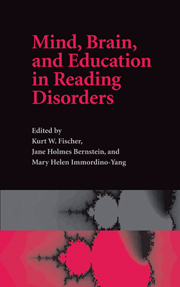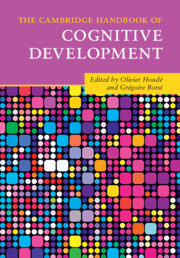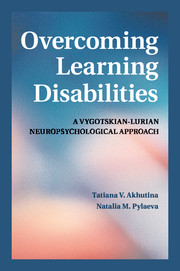Mind, Brain, and Education in Reading Disorders
One of the key topics for establishing meaningful links between brain sciences and education is the development of reading. How does biology constrain learning to read? How does experience shape the development of reading skills? How does research on biology and behaviour connect to the ways that schools, teachers and parents help children learn to read, particularly in the face of disabilities that interfere with learning? This book addresses these questions and illuminates why reading disorders have been hard to identify, how recent research has established a firm base of knowledge about the cognitive neuroscience of reading problems and the learning tools for overcoming them, and finally, what the future holds for relating mind, brain and education to understanding reading difficulties. Connecting knowledge from neuroscience, genetics, cognitive science, child development, neuropsychology and education, this book will be of interest to both academic researchers and graduate students.
- The first book to specifically relate mind, brain and education to reading disorders
- Offers perspectives from a range of leading research contributors including neuroscientists, geneticists, and cognitive scientists, as well as educators
- Chapter overviews help readers to see connections among diverse topics
Product details
May 2007Hardback
9780521854795
352 pages
229 × 162 × 27 mm
0.69kg
37 b/w illus. 15 tables
Available
Table of Contents
- Part I. What Is Reading, and What Are Reading Disorders? Looking to Neuroscience, Evolution and Genetics:
- 1. Towards a grounded synthesis of mind, brain and education for reading disorders: an introduction to the field and this book Kurt W. Fischer, Mary Helen Immordino-Yang and Deborah Waber
- 2. An evolutionary perspective on reading and reading disorders Mary Helen Immordino-Yang and Terrence W. Deacon
- Essay: brain volume and the acquisition of adaptive capacities Verne S. Caviness
- 3. The genetics of dyslexia: what is the phenotype? Albert M. Galaburda and Gordon F. Sherman
- Part II. Reading and the Growing Brain: Methodology and History:
- 4. A brief history of time, phonology, and other explanations of developmental dyslexia Maryanne Wolf and Jane Ashby
- 5. Approaches to behavioural and neurological research on learning disabilities: in search of a deeper synthesis Robbie Case
- 6. Growth cycles of mind and brain: analyzing developmental pathways of learning disorders Kurt W. Fischer, L. Todd Rose and Samuel P. Rose
- Essay: cycles and gradients in development of the cortex Robert W. Thatcher
- 7. Brain bases of reading disabilities Francine Benes and Juliana Paré-Blagoev
- 8. The neural correlates of reading disorder: functional magnetic resonance imaging Juliana Paré-Blagoev
- 9. Patterns of cortical connection in children with learning problems Frank H. Duffy
- Essay: the role of experience in brain development: adverse effects of childhood maltreatment Martin H. Teicher
- Part III. Watching Children Read:
- 10. Finding common ground to promote dialogue and collaboration: using case material to jointly observe children's behaviour Jane Holmes Bernstein
- 11. Analyzing the reading abilities of four boys: educational implications Susan Brady
- 12. First impressions: what four readers can teach us Benita A. Blachman
- 13. Analysis of reading disorders from a neuropsychological perspective H. Gerry Taylor
- 14. An education/psychological perspective on the behaviors of three children with reading disabilities Joseph K. Torgesen
- Part IV. Reading Skills in the Long Term:
- 15. The importance of comprehension in reading problems and instruction Joseph C. Campione
- Essay: bringing reading research to the trenches Sandra Priest Rose
- 16. What successful adults with dyslexia teach educators about children Rosalie Fink
- 17. Is a synthesis possible? Making doubly sure in research and application David Rose.




